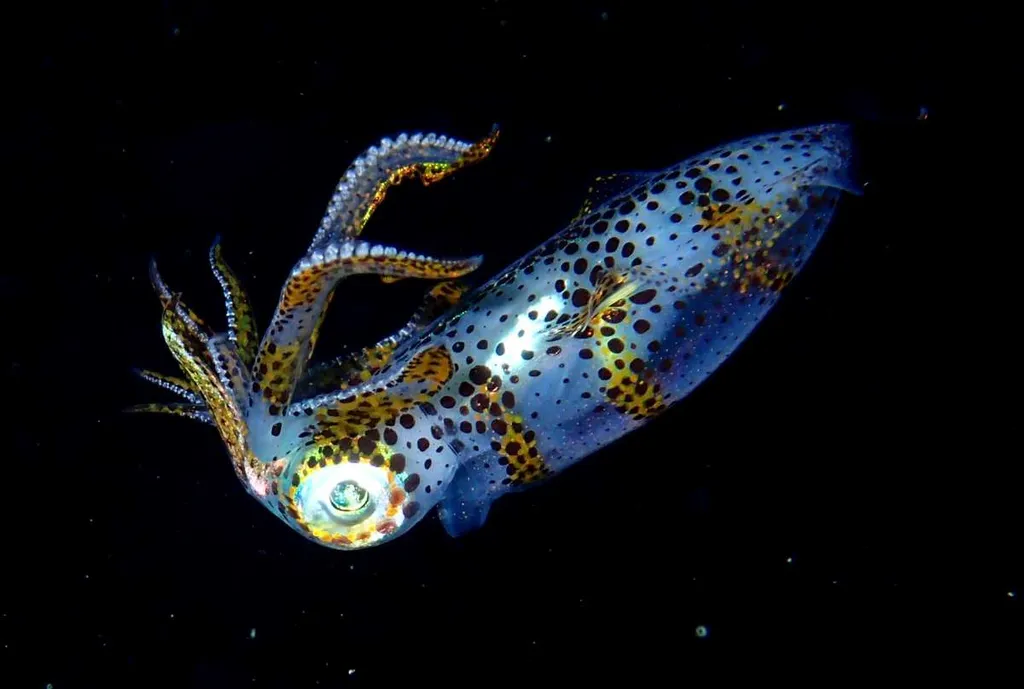In the bustling world of aquaculture, researchers are constantly seeking ways to optimize feed formulations to enhance the growth and health of farmed species. A recent study published in Aquaculture Reports, the English translation of the journal formerly known as “Aquaculture Reports,” has shed light on the optimal diet for newly hatched bigfin reef squid (Sepioteuthis lessoniana), a species with significant commercial potential. The lead author, Natthawut Chanlek, from the Aquatic Science and Innovative Management Division at the Faculty of Natural Resources, Prince of Songkla University in Thailand, and his team have made strides in this area, offering promising insights for the aquaculture industry.
The bigfin reef squid is a cephalopod that has garnered attention for its potential as a farmed species. However, the lack of knowledge surrounding the optimal feed formulation and strategy, particularly for the early stages of its life cycle, has posed a challenge. Chanlek and his team aimed to address this gap by developing a suitable moist diet formulation to improve the growth performance and feed utilization of young squid.
The researchers initially screened eight moist meat-based diet formulations using an in vitro digestibility technique. From this screening, four formulations were deemed suitable: the meat of Indian mackerel (IM), the conventional ration of whiteleg shrimp (WS), Indian mackerel and trash fish (IT), and Indian mackerel, striped catfish, and trash fish (IST). These formulations were then tested in an in vivo feeding trial with eight-day-old squid, each weighing approximately 39.0 ± 0.1 mg, over a period of two weeks.
The results were promising. Newly hatched squid fed the IST diet showed significantly higher growth compared to the other groups, followed by those fed the IT diet. “The IST group not only exhibited the highest growth but also had the lowest feed conversion ratio, indicating better feed efficiency,” Chanlek explained. This finding suggests that a well-formulated artificial diet can significantly improve the growth and feed efficiency of newly hatched bigfin reef squid.
Moreover, the IST group showed higher proteinase-specific activity and elevated levels of mantle myosin and its sum with actin compared to other groups. These biochemical markers are indicative of better muscle development and overall health. The study also found that there were no significant differences in mantle RNA concentration, protein concentration, and RNA/protein ratio between the IT and IST groups and the WS group, suggesting that these diets are comparable in terms of nutritional value.
The implications of this research are far-reaching. As Natthawut Chanlek noted, “Understanding the optimal feed formulation for newly hatched bigfin reef squid can pave the way for more efficient and sustainable aquaculture practices.” This study not only provides a roadmap for improving the growth and health of farmed squid but also offers a model for developing optimal feed strategies for other cephalopod species.
The commercial impacts of this research are substantial. The bigfin reef squid is a valuable species in the aquaculture industry, and optimizing its feed formulation can lead to increased production and profitability. Furthermore, the insights gained from this study can be applied to other areas of aquaculture, contributing to the overall advancement of the field.
As the aquaculture industry continues to grow, the need for innovative and sustainable practices becomes ever more critical. This research represents a significant step forward in meeting that need, offering a glimpse into the future of aquaculture and the potential for enhancing the growth and health of farmed species. With continued research and innovation, the aquaculture industry can look forward to a future of increased efficiency, sustainability, and profitability.

